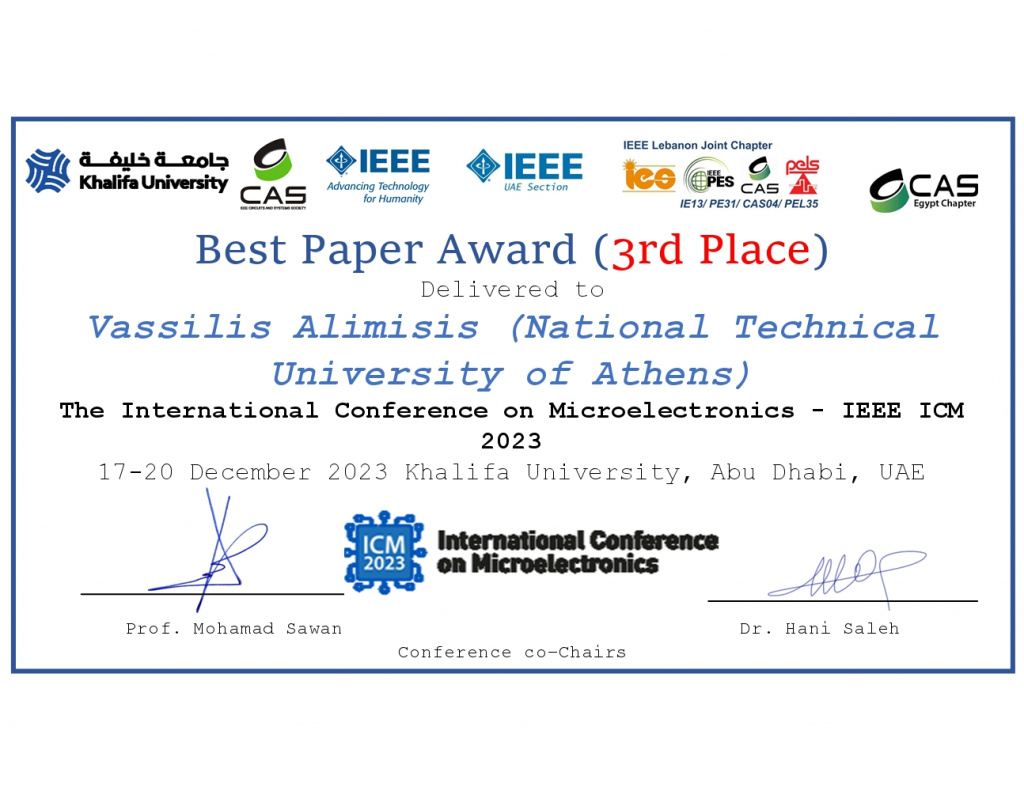We are thrilled to share that Dr. Nikolaos Temenos Ph.D. dissertation, titled "Stochastic Computing Architectures for Information Processing Systems", has been honored with the Iakovos Giourounlian Award for 2023 by the National Technical University of Athens and the School of Electrical and Computer Engineering - NTUA. This award is granted annually to the two best Ph.D. dissertations, recognizing research that demonstrates significant industrial relevance in addition to theoretical contributions. Link to the Iakovos Giourounlian Award announcement: https://lnkd.in/dZD7ExCr
In a grand ceremony held on June 10, 2024, the National Technical University of Athens(NTUA) School of Electrical and Computer Engineering proudly conferred the title of Doctor Honoris Causa upon Anantha P. Chandrakasan, MIT’s Chief Innovation and Strategy Officer, Dean of Engineering, and Vannevar Bush Professor of Electrical Engineering and Computer Science. The prestigious event took place in the esteemed Kaftanzoglou Hall of NTUA’s Averof Building.
Anantha P. Chandrakasan was recognized for his pioneering research in low-power electronics, visionary leadership in engineering and technology, and unwavering commitment to advancing knowledge and educating future generations of engineers.
The ceremony was attended by distinguished guests, including university officials, faculty members, and members from the broader scientific community. Additionally, in honor of Prof. Chandrakasan, the Greek MIT professors Antoniadis, Patrikalakis, Sapsis, Triantafyllou, Tsitsiklis, Christia, and Prof. Daskalakis, who is a graduate of our School, were also present, further highlighting the great significance of this occasion.
NTUA Rector, Professor Ioannis Chatjigeorgiou, opened the ceremony by highlighting Chandrakasan’s impact on technology. Vice Dean Pavlos Georgilakis, standing in for Dean Panayiotis Tsanakas, praised Chandrakasan's contributions and extended congratulations on behalf of our School, noting the honor of awarding him the Doctor Honoris Causa. Professor Manos Varvarigos served as the master of ceremonies.
Our own Professor Paul-Peter Sotiriadis of NTUA, a former PhD student of Chandrakasan at MIT, provided an insightful overview of Chandrakasan's groundbreaking work. He highlighted the transformative impact of Chandrakasan's research on energy-efficient integrated circuits and systems, which has driven advancements in low-power computing devices. Sotiriadis also shared personal reflections on Chandrakasan's unwavering dedication to mentoring and inspiring the next generation of engineers.
Anantha P. Chandrakasan, who joined MIT’s faculty in 1994, has made significant contributions to the development of energy efficient integrated circuits, impacting technologies such as wireless sensors and personal multimedia terminals. Throughout his career, he has mentored 75 PhD students and received numerous prestigious awards, including the IEEE Donald O. Pederson Award in Solid-State Circuits and the IEEE Mildred Dresselhaus Medal. He is a Fellow of both the IEEE and the Association for Computing Machinery, and an elected member of the National Academy of Engineering and the American Academy of Arts and Sciences.
Since his appointment as MIT’s Dean of Engineering in 2017, Chandrakasan has spearheaded over 20 cross-disciplinary initiatives, focusing on critical global issues such as climate change, sustainability, artificial intelligence, and life sciences. His efforts have significantly advanced MIT’s strategic goals and fostered a culture of interdisciplinary collaboration and innovation.
In his acceptance speech, Chandrakasan discussed the latest advancements in energy-efficient and secure circuits and systems. He also highlighted the strong collaborative ties between MIT and NTUA, emphasizing their shared dedication to addressing global challenges through research and innovation. He noted the fruitful exchange of scholars between the institutions, with 15 NTUA graduates becoming MIT faculty and 14 MIT graduates joining NTUA's faculty, with our School of Electrical and Computer Engineering playing a key role in this exchange.
Expressing his gratitude, Chandrakasan remarked, "It is an immense honor to join the esteemed community of NTUA by receiving the Honorary Doctorate from the School of Electrical and Computer Engineering. Our shared commitment to excellence and innovation drives us to make meaningful contributions to the world."
This momentous event brought MIT, the world’s top engineering school, closer to our School of Electrical and Computer Engineering (ECE), thanks to our own Professor Paul Sotiriadis, who initiated the honorary doctorate for Chandrakasan and orchestrated his visit to Greece, along with all the meetings the MIT Dean had to foster collaboration.
Following the ceremony, a reception was held, providing participants the opportunity to converse with Professor Chandrakasan. Subsequently, he met with numerous NTUA students, primarily from our School. He answered questions about MIT, engaged in discussions, exchanged ideas, and offered suggestions on how to enrich their studies and plan their future career steps. The students participated with great enthusiasm.
After the event, Professor Chandrakasan, accompanied by Professor Sotiriadis, met with Prime Minister Kyriakos Mitsotakis and Minister of Education Kyriakos Pierrakakis at Maximos Mansion to discuss potential collaborations between MIT and Greece. During his stay, Chandrakasan also engaged in discussions with leaders from the business, industrial, and shipping sectors, organized by Professor Sotiriadis. These meetings further explored opportunities for partnership and innovation, aiming to establish collaborations between MIT, NTUA, and Greece in general.



With Deputy Minister of Environment & Energy Alexandra Sdoukou (middle), George M. Karagiannis, PhD, CEM®, Damianos Efthymiadis, Gianpiero Nacci, and Marko Davila.